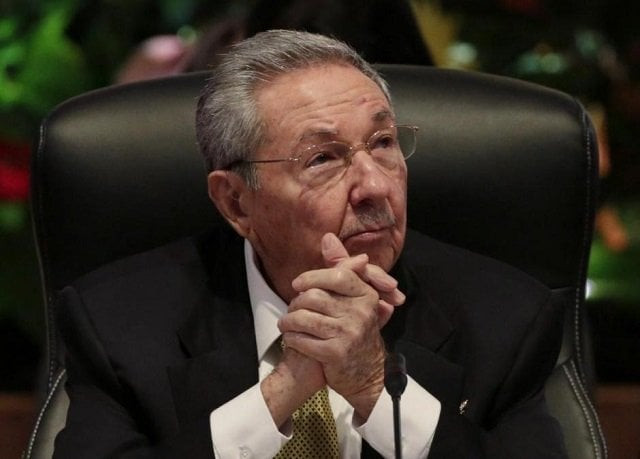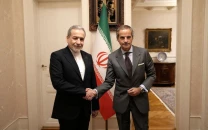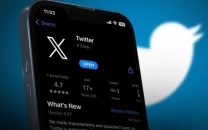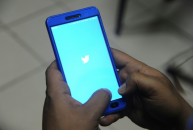Cuba celebrates 60 years of revolution amid challenges and change
Ex-president Raul Castro lashed out at what he called a return by the US government to 'confrontation with Cuba'

Cuba's President Raul Castro PHOTO: REUTERS
Ex-president Raul Castro lashed out at what he called a return by the United States government to "confrontation with Cuba" after restoration of diplomatic ties and a friendlier tone under the former administration of Barack Obama.
"Now, once again the US government seems to take the course of confrontation with Cuba and to present our peaceful and supportive country as a threat to the region," said Castro, first secretary of the Communist Party.
He gave his address at the grave in Santiago de Cuba of his brother Fidel Castro, Cuba's revolutionary leader who died in 2016.
"Increasingly, senior officials of the (Donald Trump) administration, with the complicity of some lackeys, disseminate new falsehoods and once again seek to blame Cuba for all the ills of the region," he added in the presence of President Miguel Diaz-Canel, 58, the first president since 1976 who is not a Castro.
Diaz-Canel took over in April as president from Raul Castro, who retains the top party post and called in his speech for living side-by-side with the US "in a mutually beneficial relationship of peace and respect."
It is the first such anniversary of the post-Castro era, and coincided with the inauguration in Brazil of far-right President Jair Bolsonaro, whose recent election victory is one of several for right-wing governments across the region.
Bolsonaro, who had made a point of not inviting Diaz-Canel and Venezuela's Socialist leader Nicolas Maduro to his inauguration, unfolded his nation's green and yellow flag in Brasilia and proclaimed: "This is our flag, which will never be red."
Like Brazil, Argentina, Chile and Peru have all swung to the right in recent years, unseating leftist governments.
Maduro paid tribute to the "heroic Cuban people" in a tweet, lauding their "resistance and dignity" in the face of "60 years of sacrifices, struggles and blockade."
Another surviving leftist leader, Bolivia's Evo Morales, said Cuba's revolution gave birth to "the light of hope and invincible will for the liberation of the people."
The streets of Santiago were adorned with flags and posters. In one, a vigorous Fidel raises a rifle next to Raul, with the legend "60 years of victories."
Diaz-Canel wasn't even born when Fidel Castro declared victory for his revolution on January 1, 1959.
US-backed dictator Fulgencio Batista had fled the country earlier that day, opening the way for Castro to install a one-party communist system.
Today Cuba remains one of only a handful of communist states left in the world, and has been under a US economic embargo since 1962.
Last week, a defiant Diaz-Canel wrote on Twitter: "The Cuban revolution is invincible, it grows, it lasts." But not everyone is convinced.
Dissident Vladimiro Roca, whose father Blas Roca served as a high-ranking official under Fidel Castro, insists that "the revolution died a long time ago."
Abroad, Cuba's government has faced heavy criticism for its authoritarian nature, intolerance of opposition and persecution of detractors. Vladimiro Roca was jailed from 1997 to 2002 for his protests.
And while US-Cuba relations thawed under Obama, the Caribbean island of 11 million people has had to contend with an increasingly hostile administration under Trump these last two years.
Change is coming, though.
In February, the communist government is to submit to referendum a new constitution that will officially recognise private property, markets and foreign investment.
However, the document also ratifies communism as the nation's "social goal," insists the country will "never" return to capitalism, and defines the Communist Party as by nature, single, and the "supreme political force of state and society."
Economic changes are on the way as well. One deal, between Major League Baseball in the US and the Cuban Baseball Federation, will allow the island's top talents to sign multi-million dollar agreements with MLB clubs.
"For sure, a new cycle is being opened. This cycle is continuity and change," academic Arturo Lopez-Levy, from Gustavus Adolphus College in Minnesota, told AFP.
That's not the view of Jorge Duany, director of the Cuban Research Institute at Florida International University.
"For now, it looks like Castrism without a Castro" in power, he said.
Russia and China remain allies, but neither has shown willingness to subsidise the country's economy in the way the former Soviet Union did for 30 years.
Diaz-Canel has repeatedly said that the "most important battle is the economy," which has grown barely one percent in recent years, not enough to support its population.
The president and his team are left "with the challenge of applying a contradictory policy," said Lopez-Levy. Cuba is institutionalising the revolution during economic crisis, while the Communist Party creates a market economy in which inhabitants can get rich in a society based on egalitarian principals.


















COMMENTS
Comments are moderated and generally will be posted if they are on-topic and not abusive.
For more information, please see our Comments FAQ